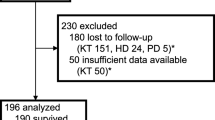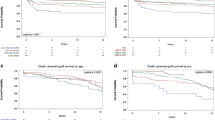Abstract
Background
Patient and graft survival rates after pediatric kidney transplantation have improved recently. Therefore, the quality of life or social outcome after kidney transplantation has become important for patients and their families.
Methods
Patients who underwent kidney transplantation at < 18 years old and were observed for > 10 years were included in this study. The median age at first kidney transplantation was 9.2 (interquartile range [IQR] = 5.6–13.0) years; there were 56 males and 50 females. The median age at last follow-up was 29.9 (IQR = 22.2–36.0) years. We evaluated the patients’ renal function, growth, professional status, and marital status at the last follow-up.
Results
The percentage of functioning grafts at the last follow-up was 81.1%; 73 patients (68.9%) had a first graft. The mean estimated GFR was 51.0 ± 20.5 mL/min/1.73 m2. Twenty patients received dialysis for graft failure. The mean final heights of the males and females were 158.1 ± 9.2 cm (− 2.2 standard deviations) and 149.1 ± 6.4 cm (− 1.7 standard deviations), respectively. Excluding 23 students, 63 patients (75.9%) were employed. Office worker was the most common profession. Twelve patients (14.5%) were unemployed. Of patients > 20 years old, 14 (16.7%), three males and 11 females, were married. Five females had one child each.
Conclusions
The graft survival rate was favorable. The final height was short, particularly in male. The rate of employment was relatively high. The rate of marriage and having children were still low. Improving the social outcome is an important problem after pediatric kidney transplantation.


Similar content being viewed by others
References
Groothoff JW, Gruppen MP, Offringa M, Hutten J, Lilien MR, Van De Kar NJ, et al. Mortality and causes of death of end-stage renal disease in children: a Dutch cohort study. Kidney Int. 2002;61:621–9.
McDonald SP, Craig JC, Australian and New Zealand Paediatric Nephrology Association. Long-term survival of children with end-stage renal disease. N Engl J Med. 2004;350:2654–62.
Tjaden LA, Vogelzang J, Jager KJ, van Stralen KJ, Maurice-Stam H, Grootenhuis MA, et al. Long-term quality of life and social outcome of childhood end-stage renal disease. J Pediatr. 2014;165:336–42.
Wong G, Howard K, Chapman JR, Chadban S, Cross N, Tong A, et al. Comparative survival and economic benefits of deceased donor kidney transplantation and dialysis in people with varying ages and co-morbidities. PLoS ONE. 2012;7:e29591.
Groothoff JW, Grootenhuis MA, Offringa M, Stronks K, Hutten GJ, Heymans HS. Social consequences in adult life of end-stage renal disease in childhood. J Pediatr. 2005;146:512–7.
Groothoff JW, Grootenhuis M, Dommerholt A, Gruppen MP, Offringa M, Heymans HS. Impaired cognition and schooling in adults with end stage renal disease since childhood. Arch Dis Child. 2002;87:380–5.
Offner G, Latta K, Hoyer PF, Baum HJ, Ehrich JH, Pichlmayr R, et al. Kidney transplanted children come of age. Kidney Int. 1999;55:1509–17.
Bartosh SM, Leverson G, Robillard D, Sollinger HW. Long-term outcomes in pediatric renal transplant recipients who survive into adulthood. Transplantation. 2003;76:1195–200.
Broyer M, Le Bihan C, Charbit M, Guest G, Tete MJ, Gagnadoux MF, et al. Long-term social outcome of children after kidney transplantation. Transplantation. 2004;77:1033–7.
Rosenkranz J, Reichwald-Klugger E, Oh J, Turzer M, Mehls O, Schaefer F. Psychosocial rehabilitation and satisfaction with life in adults with childhood-onset of end-stage renal disease. Pediatr Nephrol. 2005;20:1288–94.
Rees L, Shroff R, Hutchinson C, Fernando ON, Trompeter RS. Long-term outcome of paediatric renal transplantation: follow-up of 300 children from 1973 to 2000. Nephron Clin Pract. 2007;105:c68-76.
Morel P, Almond PS, Matas AJ, Gillingham KJ, Chau C, Brown A, et al. Long-term quality of life after kidney transplantation in childhood. Transplantation. 1991;52:47–53.
Furth SL, Hwang W, Yang C, Neu AM, Fivush BA, Powe NR. Growth failure, risk of hospitalization and death for children with end-stage renal disease. Pediatr Nephrol. 2002;17:450–5.
Mellerio H, Alberti C, Labèguerie M, Andriss B, Savoye E, Lassalle M, et al. Adult social and professional outcomes of pediatric renal transplant recipients. Transplantation. 2014;97:196–205.
Uemura O, Nagai T, Ishikura K, Ito S, Hataya H, Gotoh Y, et al. Creatinine-based equation to estimate the glomerular filtration rate in Japanese children and adolescents with chronic kidney disease. Clin Exp Nephrol. 2014;18:626–33.
Matsuo S, Imai E, Horio M, Yasuda Y, Tomita K, Nitta K, et al. Revised equations for estimated GFR from serum creatinine in Japan. Am J Kidney Dis. 2009;53:982–92.
Tjaden LA, Maurice-Stam H, Grootenhuis MA, Jager KJ, Groothoff JW. Impact of renal replacement therapy in childhood on long-term socioprofessional outcomes: a 30-year follow-up study. J Pediatr. 2016;171:189–95.
Aoki Y, Hamasaki Y, Satoh H, Matsui Z, Muramatsu M, Hamada R, et al. Long-term outcomes of pediatric kidney transplantation: a single-center experience over the past 34 years in Japan. Int J Urol. 2020;27:172–8.
Harambat J, Ranchin B, Bertholet-Thomas A, Mestrallet G, Bacchetta J, Badet L, et al. Long-term critical issues in pediatric renal transplant recipients: a single-center experience. Transpl Int. 2013;26:154–61.
van Adrichem EJ, van de Zande SC, Dekker R, Verschuuren EA, Dijkstra PU, van der Schans CP. Perceived barriers to and facilitators of physical activity in recipients of solid organ transplantation, a qualitative study. PLoS ONE. 2016;11:162725.
Pinter J, Hanson CS, Craig JC, Chapman JR, Budde K, Halleck F, et al. ’I feel stronger and younger all the time’-perspectives of elderly kidney transplant recipients: thematic synthesis of qualitative research. Nephrol Dial Transplant. 2016;31:1531–40.
Pinter J, Hanson CS, Chapman JR, Wong G, Craig JC, Schell JO, et al. Perspectives of older kidney transplant recipients on kidney transplantation. Clin J Am Soc Nephrol. 2017;12:443–53.
Eng M, Zhang J, Cambon A, Marvin MR, Gleason J. Employment outcomes following successful renal transplantation. Clin Transpl. 2012;26:242–6.
Tzvetanov I, D’Amico G, Walczak D, Jeon H, Garcia-Roca R, Oberholzer J, et al. High rate of unemployment after kidney transplantation: analysis of the United network for organ sharing database. Transpl Proc. 2014;46:1290–4.
Driollet B, Bayer F, Chatelet V, Macher MA, Salomon R, Ranchin B, et al. Social deprivation is associated with poor kidney transplantation outcome in children. Kidney Int. 2019;96:769–76.
Acknowledgements
We thank Edanz (https://jp.edanz.com/ac) for editing a draft of this manuscript.
Author information
Authors and Affiliations
Contributions
YH, JH, YA: Participated in research design. YH, JH, MK: Participated in the writing of the paper. YH, JH, YA, MK, MK, MM, SS: Participated in the performance of the research. YH, YA, MM: Participated in data analysis. YH, JH, YA, MK, MM, TK, SS, KS: Drafting the work or revising it critically for important intellectual content. YH, TK, SS, KS: Final approval of the version to be published.
Corresponding author
Ethics declarations
Conflict of interest
Yuko Hamasaki belongs to an endowed department sponsored by Asahi Kasei Pharma Corporation, Novartis Pharma K.K., Chugai Pharmaceutical Co., and Astellas Pharma (until 28/Feb/2018). Ken Sakai received annual consultant fees from JMS Co. Ltd. The other authors have no potential conflicts of interest to disclose.
Ethical approval
The study protocol conformed to the Declaration of Helsinki (2008) and was approved by the Toho University Omori Medical Center institutional ethics committees (approval number M 20058).
Additional information
Publisher's Note
Springer Nature remains neutral with regard to jurisdictional claims in published maps and institutional affiliations.
About this article
Cite this article
Hamasaki, Y., Hashimoto, J., Aoki, Y. et al. Long-term social outcome after pediatric kidney transplantation: a single-center experience. Clin Exp Nephrol 26, 368–375 (2022). https://doi.org/10.1007/s10157-021-02158-w
Received:
Accepted:
Published:
Issue Date:
DOI: https://doi.org/10.1007/s10157-021-02158-w




